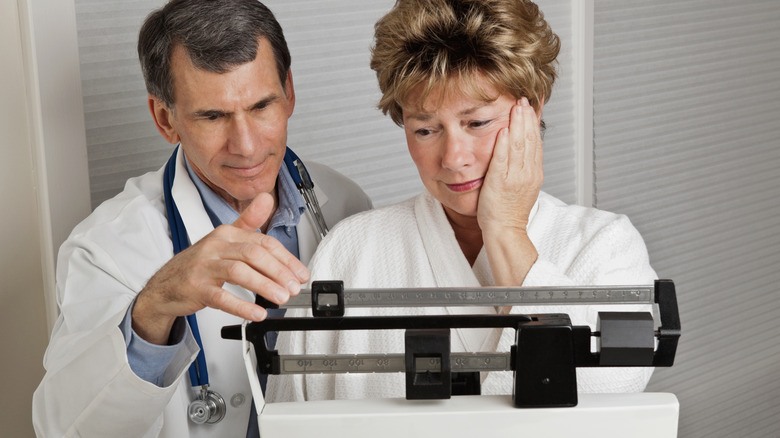You Should Find A New Doctor If This Happens To You
Every now and then, you may catch a cold, break a bone, come down with a stomach bug, or develop some strange unanticipated ailment that you Google for a wildly illogical self-diagnosis and convince yourself that you're dying of a rare disease. And then you go to the doctor to get a proper diagnosis and, ideally, some treatment that helps patch you back up. But, sometimes, your doctor can't help you. Or, at times, it can seem like they don't really want to help you. Maybe they're unqualified. Maybe they're unsure. Or maybe they're just not the right fit.
Whatever the case, in certain scenarios, it may actually be best to get back out there and find a new doc. Someone who has the background to provide you with the care you need. Or someone who has the bedside manners to give you the respect you deserve. And if any of the following situations sound familiar to you, know that it is totally acceptable (and even encouraged!) to break up with your doctor and move onto the next one.
If you are not feeling seen or heard
Ever go visit your doctor with a really anxiety-inducing concern only to feel invalidated? Or even shamed, perhaps? If you don't feel like your doctor really cares to hear what you have to say, they don't quite answer your questions, or they seem to dismiss all of your "buts," maybe it's time to carry on and shop around for new medical care.
"Someone should see a new doctor if they do not believe their symptoms are being taken seriously," Dr. Nicole (Nikki) Lacherza-Drew, a licensed psychologist and owner of Vici Psychological Care, LLC, told Health Digest. Other experts agree. "I recommend that people see a different doctor if they're not being seen and heard," Dr. Andrea Luise, a chiropractor at Lakeway Spine who has operated her practice since 2006 in Austin, Texas, told us. "The most common situation I hear is that their current doctor will tell them 'they're just getting older.' While that may be part of the condition, it certainly isn't a comprehensive answer, nor does it provide a solution."
If your doctor refuses to run tests or labs
If your doctor refuses to run tests or labs to confirm or rule out a diagnosis, it is time to find a new one, Brandy Minks, certified nutrition support clinician of Minks Medical Nutrition Therapy told Health Digest. After all, the only way to be sure about a diagnosis or to be 100 percent positive that your condition is not something else is to run some tests. Your doctor should be able to order these tests, and in some situations, you may be able to request them.
Of course, some doctors may recommend that you don't waste money on a test if they consider it unnecessary — especially if the test is not covered by your insurance provider. But if you ask for a test to feel more comfortable about your health, your doctor should comply. And if they do not, you can certainly reach out to another doctor for a second opinion.
If your doctor shames you for your weight
Have you ever felt like all your doctor wanted to talk about was your weight? Yikes. Talking pounds can often be an uncomfortable conversation. And talking about the number on the scale in relation to your health can make you feel fragile, too. Sure, a person's weight can have an impact on their overall health. But your health is not solely related to your weight (via The Atlantic). Additionally, your doctor should never put you down for your weight. Rather, they should be encouraging and supportive. After all, their job is to help you get healthier, not kick you while you're down.
"While doctors take the first place with women and the second place with men as the provider that exhibits the most weight stigma, all healthcare providers have the potential to exhibit weight bias," certified nutrition support clinician Brandy Minks of Minks Medical Nutrition Therapy told us. It's time to move on if your provider takes the whole appointment to talk about your weight, chalks all symptoms up to your weight, recommends weight loss as the only treatment option, or shames you for your weight, she said.
If your doctor isn't an expert in your condition
"Finding a new doctor can seem like a daunting task, but sometimes it's necessary," Dr. Anthony Puopolo, chief medical officer at RexMD, told Health Digest. "If your current doctor doesn't have much knowledge in the specific area you need help with, you may need to find another healthcare provider."
Not everyone is an expert at everything. If that were the case, well, no one would be considered an expert, now would they? For example, your general doctor might be able to tell you that your blood work seems off and your heart rate is acting a little wonky. And they might even be able to tell you why and prescribe you some treatments to help. But they'll also likely recommend that you see a cardiologist who specializes in the heart and can unpack your problem much deeper.
Similarly, Puopolo added, "If you're in therapy for trauma, and your therapist doesn't have much experience with how to deal with it, you should definitely look for another one."
If you just don't click
It might sound weird, but finding a good doctor is not all that different than dating. You often need to "date around" to find someone with whom you are comfortable. Likewise, your doctor needs to be someone with whom you can open up, be vulnerable around, share truths, and ask intimate questions. They also need to be someone you can trust. But sometimes, like a bad or just "meh" date, you simply don't click. And if when that happens, it is totally okay to get back out on the market.
This is especially key when it comes to your mental health. "In mental health, the relationship with your therapist is so important to the process," Melissa Bailey, a licensed mental health counselor, told Health Digest. "I tell each client in our first session that I would much rather give some referrals to help them find someone who might fit their needs than be ghosted or waste their time if they do not feel comfortable with me for whatever reason."
If your questions or concerns go unresolved
Sometimes you go to the doctor and get answers and feel relief; other times you go to the doctor and don't get answers and feel even more confused than you did when you walked into the office. If the latter is consistently the case, it's time to find a new doctor. Your doctor may not have the experience or expertise to give you great quality care or resolve your concerns.
"When you have been seen by your current provider on more than two occasions for the same condition and your care is not resolved, it may mean [it's time to see] a specialist [for] a higher level of care," Dr. Patrice Little, a nurse practitioner, told Health Digest. "Specialists have a deeper understanding of common conditions that are managed by most primary care physicians and family nurse practitioners. Seeing a specialist at the right time can decrease a patient's chance of developing complications that could lead to debilitation or death." Changing providers gives you the opportunity to start anew and feel more involved to get the care you deserve, Dr. Little added.
If your doctor is insensitive
According to nurse practitioner Dr. Patrice Little, finding a doctor who is respectful is key. After all, the doctor-patient relationship is personal in nature. They have to get to know your story. So if you share your story and your doc is racially or culturally insensitive, it can feel soul-crushing. "Making generalizations of a racial and cultural group can be insensitive," Dr. Little explained to Health Digest. "It is known that patients of different backgrounds from their providers' concerns may not be taken as seriously. As a result, there can be a delay in treatment that can lead to injury or death."
Dr. Melissa Simon, director of the Institute for Public Health and Medicine-Center for Health Equity Transformation at Northwestern University's Feinberg School of Medicine, would no doubt agree. "It's important and completely reasonable and understandable that a patient would want somebody to care for them [who is] empathic and embodies the ability to be able to be responsive to cultural differences, whether they're racial, ethnic, religious, whether they're gender-based or [part of] the whole gamut of potential diverse issues," she told Health. If you're not getting this from your doctor, it's certainly time to make a change.
If your insurance doesn't cover your doctor
You should consider looking for a new doctor if your insurance provider does not cover your care. Not every doctor is going to be in your network. But the chances are that you can find someone who is. And that someone will be a heck of a lot more affordable than paying out of pocket!
"Start with your insurance company's website to search for health-care providers in your new area who are taking new patients," Teri Dreher, a registered nurse at NShore Patient Advocates, told Health Digest. "Some websites offer star ratings based on patients' feedback. It's very important to call and confirm a provider is in your insurance network and that they are located where the website says."
It is also important to consider other factors when looking for a new doctor, like location, how far in advance you will need to schedule appointments, whether or not telehealth appointments are available, and so on.
If your doctor is hard to reach
If it feels like pulling teeth trying to get in touch with your doctor, maybe it is time to move on. Having to wait too long to sign in at the office and fill out a form or getting placed into a room only to wait a long while more are also frustrating experiences. Likewise, if your doctor is always canceling or rescheduling your appointments, you may want to reconsider making another appointment. When you need care, you need care. And having trouble getting through and dealing with disorganization and long waits all the time can become a problem.
"If [it] is difficult to reach the office by phone or other means, it's a red flag that may signify a poorly run business," neuroradiologist Robert Wolf told Health Digest. "Having to wait too long to see the doctor is, too. This should be a fluent, organized, and timely process. The patient's time is valuable, too!"
If the doctor's office is not a clean or comfortable environment
Your doctor's office can really make or break your experience. For one, if the office is too far away or inconveniently located, it can make going to the doctor a real pain. What's potentially worse, however, is arriving at a messy office. You know, "if the office does not appear to be up to date, clean, organized or current with its technology," explained neuroradiologist Robert Wolf. "Similarly, office staff or doctors who are unkempt and/or lack personal hygiene may be a turn-off."
Don't hesitate to look for a new doctor if you are not feeling the vibe of the office. The space where you are being given care should feel comfortable and sanitary. If it doesn't, you can look for comfort and cleanliness someplace else. It is not asking too much! After all, a doctor's office should be a place the promotes good health, and clutter and subpar hygienic practices encourage just the opposite.
If your doctor has poor bedside manners
"The most important element of patient care is the relationship between doctor and patient," psychologist Bruce Forman told Health Digest. "If you don't feel you are being validated as a human being, it's time to switch."
As a former member of a medical school faculty, Forman explained that it is customary for medical students to be taught the importance of bedside manners. "Failure to establish a comfortable relationship with a patient is a sign the physician doesn't really value patients or their human qualities," he continued.
If you feel like your doctor is being rude or does not seem to care about you, well, you should find a doctor who won't be rude and does seem to care about you. At the end of the day, we are all only human, and we want (and deserve) to be treated with respect. Bedside manners are not just a nice added bonus — they are a necessity when it comes to quality care.
If the doctor's staff is rude or disorganized
If your doctor's office is disorganized, it could be a major red flag, according to neuroradiologist Robert Wolf. In a disorganized office, it is easy for "information such as important documents, labs, radiology results, and the like [to] go missing, and studies need to be repeated," Wold told us.
The last thing you want to worry about when you trust your doctor with your health is that they are going to lose your records and you won't have any trace of them. Your only concern should be the condition that brought you in to see the doctor in the first place — and even then, you should feel relieved to speak to your doctor. It's not your job to do the office's due diligence, either. If you need to, find a more organized doctor and have your paperwork transferred over (you know, before they lose them).
If you feel confused when you leave the office
The last thing you should feel when you leave your doctor's office is even more confused than you were when you walked in. And, yet, this happens more often than we care to admit.
"If you notice that you are leaving your provider's office feeling worse than you went in, uncomfortable, or that you have no idea what they were just talking about, it's time to ask for a follow-up or to see someone else," Dr. Nicole (Nikki) Lacherza-Drew, a licensed psychologist and owner of Vici Psychological Care, LLC, told Health Digest. After all, your doctor is there to provide answers, offer clarity, create a sense of calm, and get you back on a healthy track with treatment. They are not there to condescend or confuse you. And, if they do, they are likely not the doctor you should be seeing anymore.
If your symptoms are worsening
"If it has been several months, and your symptoms are worsening or stayed the same, you might need a different form of treatment," Dr. Nicole (Nikki) Lacherza-Drew, a licensed psychologist and owner of Vici Psychological Care, LLC, confirmed to Health Digest. And that treatment might have to come from another doctor.
Of course, your doctor may not always be able to pinpoint exactly what is wrong the first time around. Or you might not always respond well to different courses of treatment. Treatment can involve a bit of trial and error — that is normal and to be expected. That said, if your condition is not getting better after quite some time — or if it is getting worse — it is wise to consult another doctor.
At the end of the day, you have to be your own biggest advocate. Speak up if something is not working. And look around for other care if you feel your doctor isn't helping.















